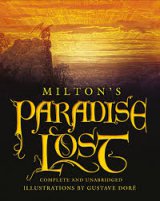Paradise Lost Page #7
Paradise Lost is an epic poem in blank verse by the 17th-century English poet John Milton. The first version, published in 1667, consisted of ten books with over ten thousand lines of verse. A second edition followed in 1674, arranged into twelve books with minor revisions throughout and a note on the versification.
Thus Belial with words cloath’d in reasons garb Counsel’d ignoble ease, and peaceful sloath, Not peace: and after him thus Mammon spake. Either to disinthrone the King of Heav’n We warr, if warr be best, or to regain Our own right lost: him to unthrone we then May hope, when everlasting Fate shall yeild To fickle Chance, and Chaos judge the strife: The former vain to hope argues as vain The latter: for what place can be for us Within Heav’ns bound, unless Heav’ns Lord supream We overpower? Suppose he should relent And publish Grace to all, on promise made Of new Subjection; with what eyes could we Stand in his presence humble, and receive Strict Laws impos’d, to celebrate his Throne With warbl’d Hymns, and to his Godhead sing Forc’t Halleluiah’s; while he Lordly sits Our envied Sovran, and his Altar breathes Ambrosial Odours and Ambrosial Flowers, Our servile offerings. This must be our task In Heav’n, this our delight; how wearisom Eternity so spent in worship paid To whom we hate. Let us not then pursue By force impossible, by leave obtain’d Unacceptable, though in Heav’n, our state Of splendid vassalage, but rather seek Our own good from our selves, and from our own Live to our selves, though in this vast recess, Free, and to none accountable, preferring Hard liberty before the easie yoke Of servile Pomp. Our greatness will appear Then most conspicuous, when great things of small, Useful of hurtful, prosperous of adverse We can create, and in what place so e’re Thrive under evil, and work ease out of pain Through labour and endurance. This deep world Of darkness do we dread? How oft amidst Thick clouds and dark doth Heav’ns all-ruling Sire Choose to reside, his Glory unobscur’d, And with the Majesty of darkness round Covers his Throne; from whence deep thunders roar Must’ring thir rage, and Heav’n resembles Hell? As he our Darkness, cannot we his Light Imitate when we please? This Desart soile Wants not her hidden lustre, Gemms and Gold; Nor want we skill or art, from whence to raise Magnificence; and what can Heav’n shew more? Our torments also may in length of time Become our Elements, these piercing Fires As soft as now severe, our temper chang’d Into their temper; which must needs remove The sensible of pain. All things invite To peaceful Counsels, and the settl’d State Of order, how in safety best we may Compose our present evils, with regard Of what we are and where, dismissing quite All thoughts of Warr: ye have what I advise. He scarce had finisht, when such murmur filld Th’ Assembly, as when hollow Rocks retain The sound of blustring winds, which all night long Had rous’d the Sea, now with hoarse cadence lull Sea-faring men orewatcht, whose Bark by chance Or Pinnace anchors in a craggy Bay After the Tempest: Such applause was heard As Mammon ended, and his Sentence pleas’d, Advising peace: for such another Field They dreaded worse then Hell: so much the fear Of Thunder and the Sword of Michael Wrought still within them; and no less desire To found this nether Empire, which might rise By pollicy, and long process of time, In emulation opposite to Heav’n. Which when Beelzebub perceiv’d, then whom, Satan except, none higher sat, with grave Aspect he rose, and in his rising seem’d A Pillar of State; deep on his Front engraven Deliberation sat and publick care; And Princely counsel in his face yet shon, Majestick though in ruin: sage he stood With Atlantean shoulders fit to bear The weight of mightiest Monarchies; his look Drew audience and attention still as Night Or Summers Noon-tide air, while thus he spake. Thrones and imperial Powers, off-spring of heav’n, Ethereal Vertues; or these Titles now Must we renounce, and changing stile be call’d Princes of Hell? for so the popular vote Inclines, here to continue, and build up here A growing Empire; doubtless; while we dream, And know not that the King of Heav’n hath doom’d This place our dungeon, not our safe retreat Beyond his Potent arm, to live exempt From Heav’ns high jurisdiction, in new League Banded against his Throne, but to remaine In strictest bondage, though thus far remov’d, Under th’ inevitable curb, reserv’d His captive multitude: For he, be sure, In highth or depth, still first and last will Reign Sole King, and of his Kingdom loose no part By our revolt, but over Hell extend His Empire, and with Iron Scepter rule Us here, as with his Golden those in Heav’n. What sit we then projecting Peace and Warr? Warr hath determin’d us, and foild with loss Irreparable; tearms of peace yet none Voutsaf’t or sought; for what peace will be giv’n To us enslav’d, but custody severe, And stripes, and arbitrary punishment Inflicted? and what peace can we return, But to our power hostility and hate, Untam’d reluctance, and revenge though slow, Yet ever plotting how the Conquerour least May reap his conquest, and may least rejoyce In doing what we most in suffering feel? Nor will occasion want, nor shall we need With dangerous expedition to invade Heav’n, whose high walls fear no assault or Siege, Or ambush from the Deep. What if we find Some easier enterprize? There is a place (If ancient and prophetic fame in Heav’n Err not) another World, the happy seat Of som new Race call’d Man, about this time To be created like to us, though less In power and excellence, but favour’d more Of him who rules above; so was his will Pronounc’d among the Gods, and by an Oath, That shook Heav’ns whol circumference, confirm’d. Thither let us bend all our thoughts, to learn What creatures there inhabit, of what mould, Or substance, how endu’d, and what thir Power, And where thir weakness, how attempted best, By force or suttlety: Though Heav’n be shut, And Heav’ns high Arbitrator sit secure In his own strength, this place may lye expos’d The utmost border of his Kingdom, left To their defence who hold it: here perhaps Som advantagious act may be achiev’d By sudden onset, either with Hell fire To waste his whole Creation, or possess All as our own, and drive as we were driven, The punie habitants, or if not drive, Seduce them to our Party, that thir God May prove thir foe, and with repenting hand Abolish his own works. This would surpass Common revenge, and interrupt his joy In our Confusion, and our Joy upraise In his disturbance; when his darling Sons Hurl’d headlong to partake with us, shall curse Thir frail Originals, and faded bliss, Faded so soon. Advise if this be worth Attempting, or to sit in darkness here Hatching vain Empires. Thus Beelzebub Pleaded his devilish Counsel, first devis’d By Satan, and in part propos’d: for whence, But from the Author of all ill could Spring So deep a malice, to confound the race Of mankind in one root, and Earth with Hell To mingle and involve, done all to spite The great Creatour? But thir spite still serves His glory to augment. The bold design Pleas’d highly those infernal States, and joy Sparkl’d in all thir eyes; with full assent They vote: whereat his speech he thus renews.
Translation
Translate and read this book in other languages:
Select another language:
- - Select -
- 简体中文 (Chinese - Simplified)
- 繁體中文 (Chinese - Traditional)
- Español (Spanish)
- Esperanto (Esperanto)
- 日本語 (Japanese)
- Português (Portuguese)
- Deutsch (German)
- العربية (Arabic)
- Français (French)
- Русский (Russian)
- ಕನ್ನಡ (Kannada)
- 한국어 (Korean)
- עברית (Hebrew)
- Gaeilge (Irish)
- Українська (Ukrainian)
- اردو (Urdu)
- Magyar (Hungarian)
- मानक हिन्दी (Hindi)
- Indonesia (Indonesian)
- Italiano (Italian)
- தமிழ் (Tamil)
- Türkçe (Turkish)
- తెలుగు (Telugu)
- ภาษาไทย (Thai)
- Tiếng Việt (Vietnamese)
- Čeština (Czech)
- Polski (Polish)
- Bahasa Indonesia (Indonesian)
- Românește (Romanian)
- Nederlands (Dutch)
- Ελληνικά (Greek)
- Latinum (Latin)
- Svenska (Swedish)
- Dansk (Danish)
- Suomi (Finnish)
- فارسی (Persian)
- ייִדיש (Yiddish)
- հայերեն (Armenian)
- Norsk (Norwegian)
- English (English)
Citation
Use the citation below to add this book to your bibliography:
Style:MLAChicagoAPA
"Paradise Lost Books." Literature.com. STANDS4 LLC, 2024. Web. 22 Nov. 2024. <https://www.literature.com/book/paradise_lost_101>.




Discuss this Paradise Lost book with the community:
Report Comment
We're doing our best to make sure our content is useful, accurate and safe.
If by any chance you spot an inappropriate comment while navigating through our website please use this form to let us know, and we'll take care of it shortly.
Attachment
You need to be logged in to favorite.
Log In